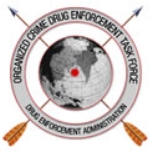The program established 12
Organized Crime Drug Enforcement Task Forces
, modeled after the successful South Florida Task Force. Each task force had the full resources of the federal government, including access to other agencies sharing similar jurisdictions. The Attorney General and Department of Justice were placed in charge of the program that has grown into a force that employs more than 10,000 special agents and has a budget greater than $2 billion.
·
Allocation of millions of dollars for prison and jail facilities.
DOJ Inspector General Audit of Task Force Funds Used by INS
(PDF)
- Table of Contents
- Overview
- History
- What it Does
- Where Does the Money Go
- Controversies
- Suggested Reforms
- Comments
- Leave a comment


Thomas W. Padden, acting director of the Organized Crime Drug Enforcement Task Forces (OCDETF), is a veteran prosecutor with experience handling drug cases for the U.S. Department of Justice.

Stuart G. Nash worked as a prosecutor in the U.S. Attorney’s Office in Washington, DC. By late 2006, Nash had attained the positions of Associate Deputy Attorney General and director of the Organized Crime Drug Enforcement Task Force.
- Latest News
- D.C. Public Schools will Teach all Second-Graders to Ride a Bike
- New Rule in Germany Limits Sales of Sex-Themed E-Books to 10pm to 6am
- What Happened to the 6-Year-Old Tibetan Boy the Chinese Government Kidnapped 20 Years Ago?
- U.S. Ambassador to Turkey Photoshops his Hair Color to Mock Turkish Mayor
- Mystery Artist Calls Attention to Unfixed Potholes by Drawing Penises around Them
The program established 12
Organized Crime Drug Enforcement Task Forces
, modeled after the successful South Florida Task Force. Each task force had the full resources of the federal government, including access to other agencies sharing similar jurisdictions. The Attorney General and Department of Justice were placed in charge of the program that has grown into a force that employs more than 10,000 special agents and has a budget greater than $2 billion.
·
Allocation of millions of dollars for prison and jail facilities.
DOJ Inspector General Audit of Task Force Funds Used by INS
(PDF)
Comments


Thomas W. Padden, acting director of the Organized Crime Drug Enforcement Task Forces (OCDETF), is a veteran prosecutor with experience handling drug cases for the U.S. Department of Justice.

Stuart G. Nash worked as a prosecutor in the U.S. Attorney’s Office in Washington, DC. By late 2006, Nash had attained the positions of Associate Deputy Attorney General and director of the Organized Crime Drug Enforcement Task Force.
- Latest News
- D.C. Public Schools will Teach all Second-Graders to Ride a Bike
- New Rule in Germany Limits Sales of Sex-Themed E-Books to 10pm to 6am
- What Happened to the 6-Year-Old Tibetan Boy the Chinese Government Kidnapped 20 Years Ago?
- U.S. Ambassador to Turkey Photoshops his Hair Color to Mock Turkish Mayor
- Mystery Artist Calls Attention to Unfixed Potholes by Drawing Penises around Them





Comments